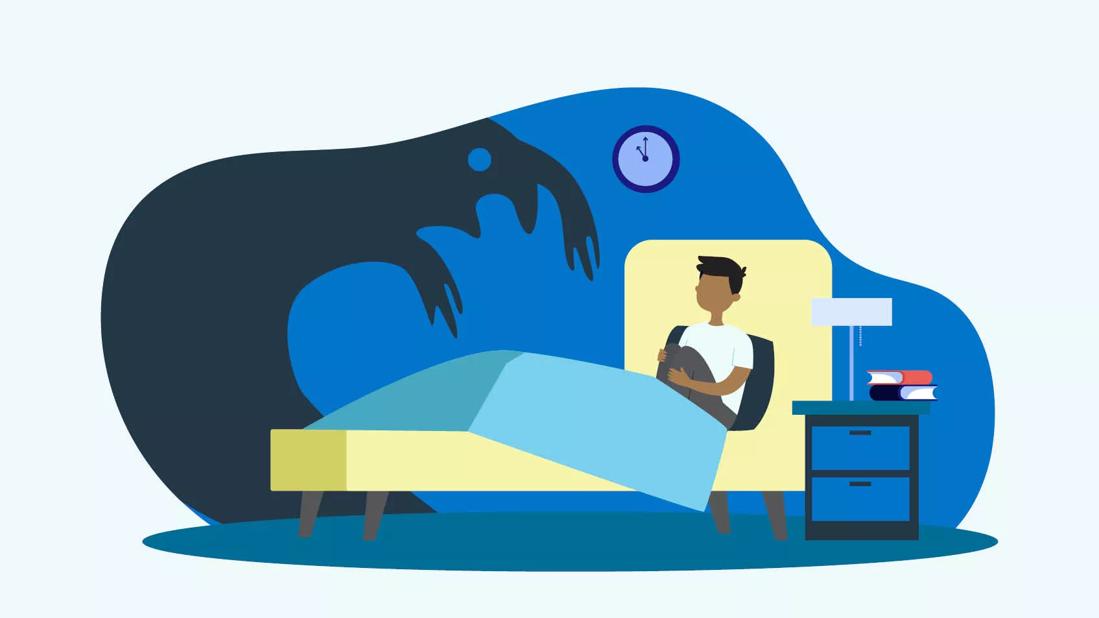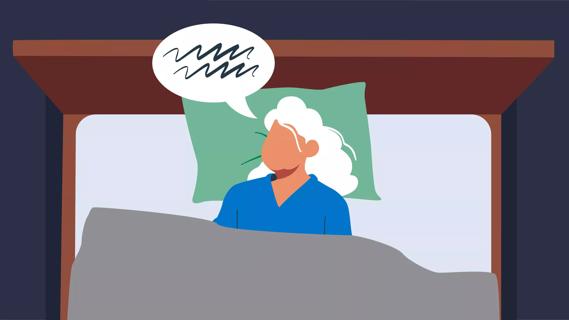Advertisement
Listen to your child to help them identify their fear and name it, but don’t reinforce it

Kids have vivid imaginations. It’s part of the fun of childhood and a normal part of their healthy development.
Advertisement
Cleveland Clinic is a non-profit academic medical center. Advertising on our site helps support our mission. We do not endorse non-Cleveland Clinic products or services. Policy
Imaginary friends are one thing, but when those little imaginations start running wild at bedtime, it can make for a fearful situation for them (and a long night for you).
Being afraid of the dark is almost like a badge of childhood. Whether they fear the monster under the bed or the witches in their closet, lights-out can be a scary time for kids.
But a fear of the dark can keep your child from getting enough sleep. And that can lead to a whole host of health and behavioral problems.
“It’s relatively common for young children at some point to have irrational fears,” says pediatrician Laura O’Connor, MD. “How parents and other caregivers address those fears and offer reassurance will affect their ability to fall asleep and stay asleep.”
We talked with Dr. O’Connor to get advice on how to help your child face their fear of the dark.
Your child isn’t alone in their fear of the dark. Plenty of kids get nervous about the night. Sleeping soundly is important to their development, though (and you need your sleep, too!). Dr. O’Connor offers these tips to help your child overcome their fears.
Find out what it is about the darkness that’s scaring your child. Ask open-ended questions to allow your child to tell you what’s triggering their fear.
Listen to your child to help them identify their fear and name it.
Advertisement
“What may seem funny or trivial to you can feel very real to your child,” Dr. O’Connor says. “When a child is scared, they can benefit from sharing it with someone. Feeling heard can help them lift the weight of that fear.”
Knowing what exactly it is about the night that scares them can help you to talk with them about it and offer support that’s specific to what they’re afraid of.
Dr. O’Connor says it’s best not to participate in your child’s fear of things that go bump in the night. For example, promising to rid their room of the creatures or inspecting the closet for monsters can reinforce their fears. If you acknowledge that the fear-provoking being exists, then your child may be led to believe that there truly is something to worry about.
Instead, acknowledge that they’re afraid, but don’t buy into it. Say things like, “I understand that you’re afraid of the dark and think Frankenstein is going to come in your window. But Frankenstein isn’t real. He can’t hurt you.”
If you need to, it’s better to join your child in their room to provide comfort than to let them leave their bedroom and join you in yours or another room. That just delays sleep and doesn’t allow your child to relax into sleep.
At bedtime, remind your child that everything is OK and they’re safe. Nothing will bother them, and they can sleep comfortably in their own bed all night. This will help reinforce to your child to trust that their own bed is a safe place.
Give them reassurance and leave their room.
If your kid wakes up in the middle of the night, reassure them again that everything is OK and that their bedroom is safe. Again, too, remind them there’s nothing to be afraid of, provide them some comfort and leave their room.
“It’s not recommended that you stay in your child’s room unless your child is extremely frightened,” Dr. O’Connor says. “When you stick around or let them come into your room, it continues to reinforce the idea that there is something to worry about.”
Building up your child’s self-confidence and coping skills during the day can help them overcome their fear of the dark.
During daytime hours, work on activities that help build self-confidence. For example, have your child talk about their bedtime fears and experiences while the sun is still out. You may be able to discuss alternative ways to respond to these fears or cope with them that may help your child feel less frightened at night.
Dr. O’Connor advises keeping the bedtime routine light, happy and fun.
In the 30 to 60 minutes before bedtime, don’t expose your child to scary movies, TV shows, frightening bedtime stories, scary music or videos, or other stimuli that may be upsetting to your child.
Instead, wind down with a relaxing bath and calming activities like light-hearted kids’ stories and age-appropriate puzzles.
Some kids respond well to having a special stuffed animal or blanket in bed with them to provide additional comfort and a sense of security.
A bit of light may do the trick, too. Some kids who are afraid of the dark find a sense of safety from a night light or very dim lamp on in their room. You might consider leaving their bedroom door open, or cracked, too — so long as your child knows the open door isn’t an invitation to wander out of their room after bedtime.
Advertisement
Toddlers and younger kids can respond especially well to rewards for good behavior. Dr. O’Connor says good old-fashioned praise and incentives that reward sleeping soundly can help give children a reason to face their fear of the dark.
After a night of good sleep, heap on the positive encouragement (“You did a great job staying in your own bed last night! I’m so proud of you!”). You can also consider small rewards, like a sticker or other small prizes to reinforce good behavior.
Being afraid of the dark isn’t unusual for children (and even some grownups. Why do you think scary movies are so popular?) But there’s perhaps no monster scarier than a sleep-deprived child.
If a fear of the dark continues for an extended period of time or is accompanied by other fears or excessive worries, consider talking with your child’s healthcare provider.
Advertisement
Learn more about our editorial process.
Advertisement

American teens are facing unprecedented rates of depression and suicide, but you can be there to support and help them

Stress, alcohol, sleep apnea and (you guessed it!) scary movies are a few common causes of bad dreams

Regular exercise, an iron-rich diet, adequate sleep and bedtime routines that include a warm bath or massage may help with your kid’s RLS

Recording your dreams may help you become more mindful, understand your thought patterns, process your emotions and even reduce your stress

Chamomile, lavender and valerian root teas may offer a faster route to dreamland

Many factors can contribute to sleep talking, like stress or anxiety, lack of or low-quality sleep, or even more serious sleep-related conditions

Unexplained injuries, mood changes and sudden isolation may be signs your child needs help

A consistent, structured routine, which may include incentives, can help children learn to stay in bed and get the ZZZs they need

Your metabolism may torch 1,300 to 2,000 calories daily with no activity

A gentle touch in all the right places may help drain your sinuses